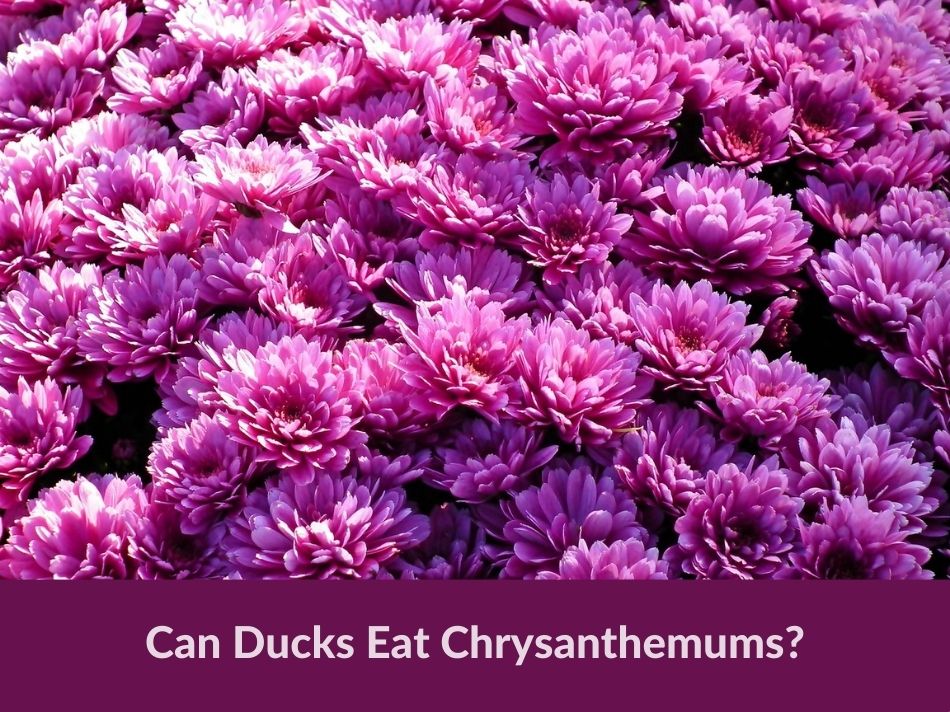Ducks are omnivorous birds that have a varied diet consisting of both plant and animal matter. Depending on their habitat, they may consume aquatic plants, algae, insects, small fish, and even crustaceans. But, can ducks eat chrysanthemums?
It’s not advisable for ducks to eat chrysanthemums. There is very little research on the topic, but what is known is that chrysanthemums contains pyrethrins, which is used as natural pest control. So it might not be the best treat for ducks.
This article delves into the science and safety of feeding chrysanthemums to ducks to bring clarity to this issue.
Nutritional Requirements of Ducks
Before we dive into the specifics of chrysanthemums, it’s essential to understand what ducks generally need in their diet. Ducks are omnivores and enjoy a wide range of foods from grains and seeds to insects and small fish.
They require protein for muscle development, vitamins for immune system health, and minerals for bone strength, among other nutrients. Commercial duck feed is usually well-formulated to provide these essential nutrients. However, supplementary foods can add variety and additional nutrients.
The Composition of Chrysanthemums
Chrysanthemums, or ‘mums’ as they are often called, belong to the Asteraceae family and are native to Asia and northeastern Europe. They are admired for their aesthetic appeal but are also used in teas and traditional medicines.
The plant contains various compounds such as flavonoids, terpenoids, and pyrethrins. While some of these compounds have nutritional and medicinal value for humans, their effects on ducks are not as well-studied.
The Problematic Compounds: Pyrethrins
Pyrethrins are natural insecticides found in chrysanthemums. They are commonly used in organic pest control. Although relatively safe for mammals, these compounds can be toxic to aquatic life and certain animals.
Ducks, being waterfowl, may exhibit varying sensitivity to pyrethrins. Ingesting large quantities of chrysanthemums could lead to symptoms like lethargy, loss of appetite, or more severe toxicity in extreme cases.
Veterinarian Opinions
Veterinarians specializing in avian health generally caution against feeding ornamental plants to birds, as the risks often outweigh the benefits. The ingestion of unknown or toxic plants can lead to gastrointestinal issues, long-term health problems, or even death in severe cases.
When it comes to chrysanthemums, the lack of comprehensive studies focusing on their safety for duck consumption further supports the need for caution.
Alternative Treats for Ducks
If you’re looking to diversify your duck’s diet, there are plenty of safer alternatives:
- Leafy Greens: Lettuce, and kale are excellent choices.
- Fruits: Apples, grapes, and watermelons can be given in moderation.
- Insects: Mealworms or earthworms are protein-rich treats.
- Grains: Rice, oats, and corn are good for carbohydrate content.
Always introduce new foods gradually and observe for any signs of allergic reactions or discomfort.
Be sure to explore our comprehensive list of plants and flowers suitable for ducks.
Conclusion
While the allure of feeding your ducks something as readily available as chrysanthemums might be tempting, the risk associated with the pyrethrin content suggests it’s not worth the gamble. Given the lack of conclusive research on the topic, coupled with advice from veterinarians, it is advisable to keep chrysanthemums off the duck menu.
Instead, focus on proven, nutritious options that meet the dietary requirements of your feathered friends. Always consult with a qualified veterinarian for personalized guidance on your duck’s diet.
Disclaimer: The information in this article is for informational purposes only. I'm not an expert or a veterinarian.


